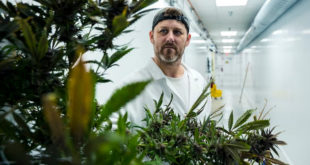
Two U.S. universities and one in South America have completed a joint study that found a reduction in the U.S. alcohol consumption in relation to the increase of medical marijuana laws in a majority of states. The findings were presented by Michele Baggio (University of Connecticut – Storrs), Alberto Chong (Georgia State University – Atlanta and Universidad del Pacifico – Lima) and Sungoh Kwon (University of Connecticut –Storrs) and add validity to what some believe proves to be true about the relationship between alcohol (wine specifically) and marijuana consumption.
The researchers used data from Nielsen Retail Scanner alcohol sales from 90 different alcohol chain stores including grocery, convenience, drug, and mass distribution retailers for a 9-year period, according to Forbes. Data was examined from figures collected between 2006-2015. This method was chosen because the researchers thought that asking consumers wouldn’t provide reliable information, since a lot people simply don’t divulge the whole truth about consumption habits.
In the time examined, counties in legal medical marijuana states displayed a near 15% drop in monthly alcohol sales.
The conclusion of the study indicates that marijuana and alcohol may be substitutes for each other. This means that they share an almost exact audience. If it’s true, then it suggests that introducing legal marijuana where alcohol consumption is legal may result in decreased alcohol sales.
Medical marijuana is available to only a small percentage of total marijuana users, but this study may be a sign of what the alcohol industry might expect in states that adopt recreational marijuana laws.
Another portion of the study looked to determine whether marijuana law reform promises a replacement of alcohol consumption completely. A definitive answer isn’t available. However, in a recent webinar regarding the state of the wine industry, host Rob McMillan, president of Silicon Valley Bank Wine Division, was joined by two guests involved in the wine industry and they stated that they see no evidence and don’t believe that marijuana will be a major substitute for wine. McMillan mentioned that beer is more likely than wine to see sales numbers drop. His reasoning: wine compliments a meal, marijuana doesn’t.
McMillan may have a point, but other factors needs to be considered too: after using marijuana, some people tend to consume more food or drink. That being said, it isn’t far-fetched to imagine that rather than decreasing alcohol sales, nationwide marijuana legalization might increase sales.
The wine and marijuana industries are at pivotal points of discovery.
 AZ Marijuana Arizona Marijuana Info
AZ Marijuana Arizona Marijuana Info






